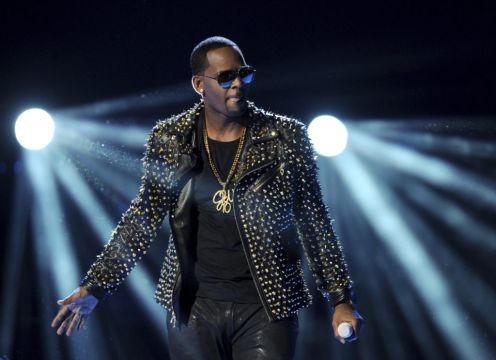R Kelly’s federal trial on allegations that he rigged his 2008 state child pornography trial and enticed girls for sex is about the R&B singer’s “dark” and “hidden” side, a prosecutor told jurors on Wednesday.
US assistant attorney Jason Julien said during opening statements that much of the world knew Kelly by his hit song I Believe I Can Fly.
Mr Julien said that was “Kelly’s public side”, then went on to add that “Kelly had another side – a hidden side, a dark side.”
“This trial is about Kelly’s hidden side,” Mr Julien said.
Kelly is charged in federal court in his home town of Chicago with enticing of minors for sex, producing child pornography and rigging his 2008 pornography trial at which he was acquitted.
Julien sought to give jurors a sense of the scale of Kelly’s alleged exploitation, saying he “repeatedly” had sex with girls who were just 14, 15 and 16 years old – “multiple girls, hundreds of times.”

Both the prosecution and Kelly’s legal team told the judge earlier in the week that they would like about an hour each to tell jurors about the kind of evidence they can expect to see and hear.
The evidentiary stage of the federal trial is expected to last about a month.
Lawyers for two Kelly co-defendants will also address jurors before the government begins calling witnesses later Wednesday. Prosecutors have not said who they will call first.
The jury was impanelled on Tuesday, with prosecutors and defence lawyers arguing toward the end of the process about whether the government was improperly attempting to keep some black people off the jury.
Kelly, who is black, is accused of enticing minors for sex, of producing child pornography and of fixing his 2008 state child pornography trial at which he was acquitted.
As the sides began exercising peremptory challenges – in which they can remove a fixed number of potential jurors from the pool – Kelly lawyer Jennifer Bonjean accused prosecutors of seeking to strike black people from the jury “to deny Mr Kelly a jury of his peers”.

Prosecutors noted many African American people had already made it on to the jury before the defence objected, and they argued their reasons for wanting to strike some had nothing to do with race.
In one case, they said an older man appeared to have a hard time staying awake.
Judge Harry Leinenweber partially agreed with the defence, disallowing prosecutors from striking three black people from the jury, and restoring them.
About half the 12 jurors impanelled were identified as black by the judge, prosecutor and defence attorneys. Six alternates were also selected.
Some of the jurors selected had watched at least part of a six-part documentary series, Surviving R Kelly, about sex abuse allegations against the Grammy award-winning singer.
Watching it was not an automatic disqualification as long as a would-be juror could assure Judge Leinenweber they could still be impartial.
Among the 12 jurors selected was a retired estate agent who had one son who was a prosecutor and another son who was a defence lawyer. Another juror was a librarian.
Among those dismissed was a woman who said she had unfavourable views of police and judges and a man who said he did not think the Internal Revenue Service should exist.

One central focus of the trial will be on whether Kelly threatened and paid off a girl with whom he allegedly videotaped himself having sex when he was about 30 and she was no older than 14.
That is the allegation underpinning another of the charges against Kelly, conspiracy to obstruct justice.
Jurors in the 2008 child pornography trial acquitted Kelly, with some later explaining that they felt they had no choice because the girl did not give evidence.
The woman, now in her 30s and referred to in court filings only as Minor 1, will be the government’s star witness.
When she gives evidence, prosecutors explained in court Monday, that they will not use her real name and will not refer to her as Minor 1. Instead, they will call her by a single pseudonym, Jane.
Kelly, 55, has already been sentenced by a New York federal judge to a 30-year prison term for a 2021 conviction on charges that he used his fame to sexually abuse other young fans.
Kelly, who rose from poverty on Chicago’s South Side to become a star singer, songwriter and producer, will be about 80 before qualifying for early release based on his sentence imposed in New York, against which he is appealing.

Kelly faces four counts of enticement of minors for sex, one each for four other accusers. They, too, are expected to give evidence.
Two Kelly associates, Derrel McDavid and Milton Brown, are co-defendants at the Chicago trial.
McDavid is accused of helping Kelly fix the 2008 trial, while Brown is charged with receiving child pornography. Like Kelly, they also have denied wrongdoing.
Minor 1 is expected to give evidence that she was on video having sex with Kelly.
The recording was at the heart of the month-long 2008 trial and was played for jurors almost every day.
Prosecutors say Kelly threatened and sought to pay off Minor 1 and her parents so they would not give evidence in 2008. None of them did.







